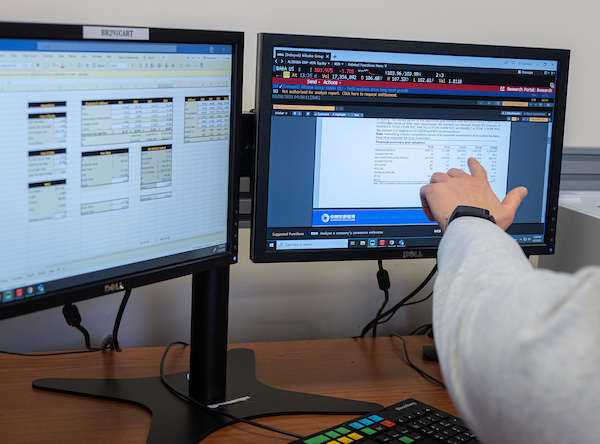Economics
Learn More about Economics
Admission Requirements
Students may initially declare an "-Interest" based major in this subject, but must still meet additional requirements to be formally accepted into the degree program.
Before a business major can be admitted to the Coles College Undergraduate Professional Program and enroll in any upper-division business courses (3000-4000 level), she or he must meet the Coles Sophomore GPA Requirement. This involves earning an Adjusted GPA of 3.00 or greater for the following seven courses:
- ACCT 2101 Principles of Accounting I
- ACCT 2102 Principles of Accounting II
- ECON 2106 Principles of Microeconomics
- ECON 2105 Principles of Macroeconomics
- ECON 2300 Business Statistics
- IS 2200 Information Systems Communications
- BLAW 2200 Legal and Ethical Environment of Business
Students should take BUSA 2150 as soon as they have completed its prerequisite of ENGL 1101. Successful completion of this course is a requirement for admission to the Coles Undergraduate Professional Program.
General Education Core IMPACTS Curriculum Recommendations for this Major
M: Students should take MATH 1111 or higher.
Double Owl Pathways
Related Minors or Certificates Available
- Business Fundamentals Certificate
- Economics Minor
Sample Classes
-
ECON 4210: Money and Financial Markets
Analyzes the operation, structure, regulation, and control of financial markets emphasizing the effects on the level and term structure of interest rates, economic activity, and business decisions. Focuses on monetary theory, monetary and fiscal policies, the Federal Reserve System, and financial institutions, markets, and instruments.
-
ECON 4410: International Trade and Finance
Principles of international trade and finance. Management of foreign operations of the firm within constraints of the international environment. Study of international currency flows, exchange rates and international banking practices.
-
ECON 4530: Public and Urban Economics
This course considers the application of economic models to analyze the role of government in correcting market failures, the effects of taxation and expenditure policies on the allocation of resources, and the distribution of income. There is an emphasis on the optimal provision of public goods, the incidence and behavioral effects of taxes, regulation of externalities, public choice and the spatial organization of the economy.
-
ECON 4760: Business Forecasting
Econometric and time series methods for forecasting business and economic data are introduced. Specific topics include: basic graphic methods for analyzing data; modeling forecasting trend and seasonality; ARMA modeling of time series; unit root and ARIMA process; forecasting volatility; evaluation and comparison of forecasting models.












